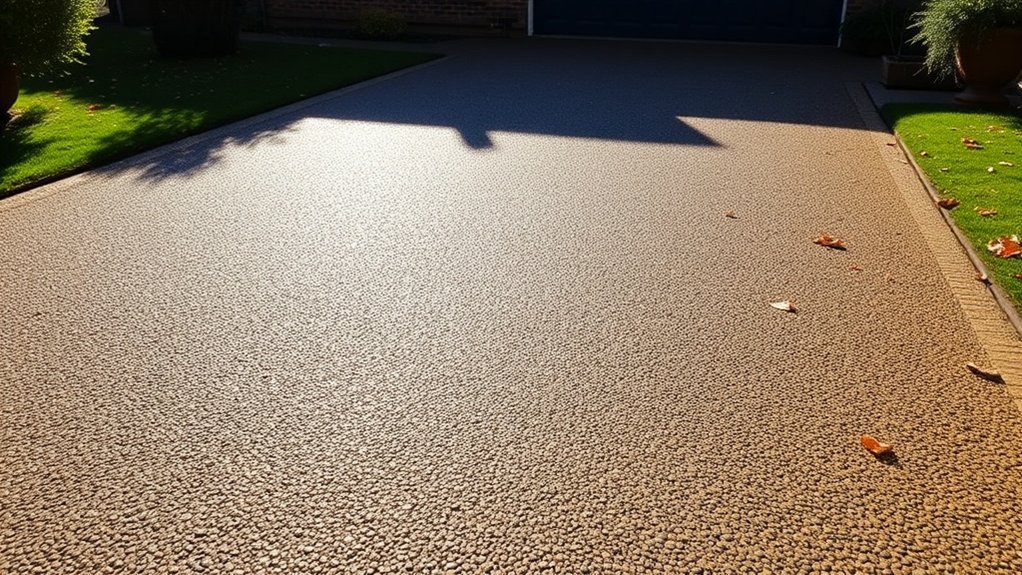Resin-bound driveways help reduce tire marks and oil stains due to their unique properties. The flexible resin absorbs movement, which prevents cracking, while the smooth, non-porous surface stops oil from soaking in, making it easy to clean. Plus, the permeable structure allows for effective water drainage, reducing moisture and minimising tire marks. With proper upkeep, these driveways are durable and can withstand various weather conditions. Overall, resin-bound driveways offer long-lasting quality with minimal maintenance.
Key Takeaways
Resin-bound driveways are designed to minimise tire marks and oil stains effectively. Their smooth, non-porous surface prevents oil from being absorbed, making spills easy to clean and keeping stains less visible.
Additionally, the UV stabilization in the resin keeps the surface hard and resistant to softening, which helps to reduce the likelihood of tire marks. The material’s flexibility and elasticity also absorb ground movements, which decreases the risk of cracking and enhances durability against impressions from tyres.
The permeable structure allows for effective water drainage, reducing moisture build-up that can lead to unsightly marks and stains. Regular maintenance, like promptly cleaning spills and sweeping, will help prevent permanent staining and keep your driveway looking pristine.
Surface Composition & Material Selection
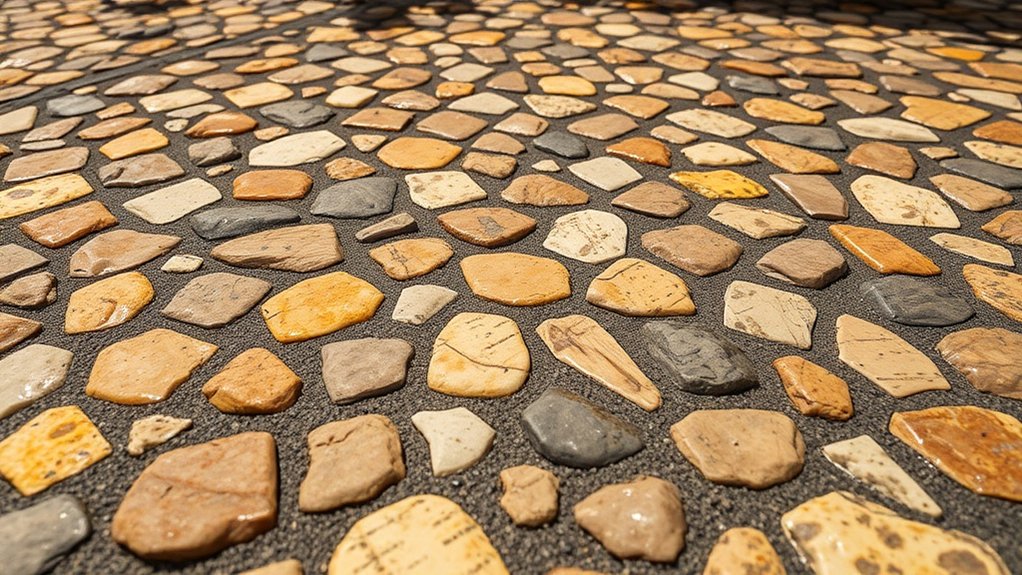
When considering a resin-bound driveway, it’s essential to understand the surface composition and material selection for optimal performance. The type of aggregates you choose significantly affects both the look and functionality of the driveway.
Natural aggregates such as gravel, quartz, and marble come in a variety of sizes and colours, allowing for a personalised finish. Using high-quality, kiln-dried aggregates is crucial, as they ensure consistent performance. Make sure they’re clean and dust-free. Additionally, selecting from top resin aggregates ensures you are choosing materials recognized for their durability and aesthetic appeal.
The texture of the aggregates is important; rounded or polished stones can reduce oil adherence and tire marks, while porous aggregates help with drainage, preventing water from pooling. Moreover, the permeability of resin bound driveways ensures effective water drainage, further enhancing their resistance to stains and marks.
Selecting the right resin binder is also key, as it should fully encapsulate the aggregates to enhance durability and keep the driveway looking its best over time.
Physical Properties Affecting Tire Mark Resistance
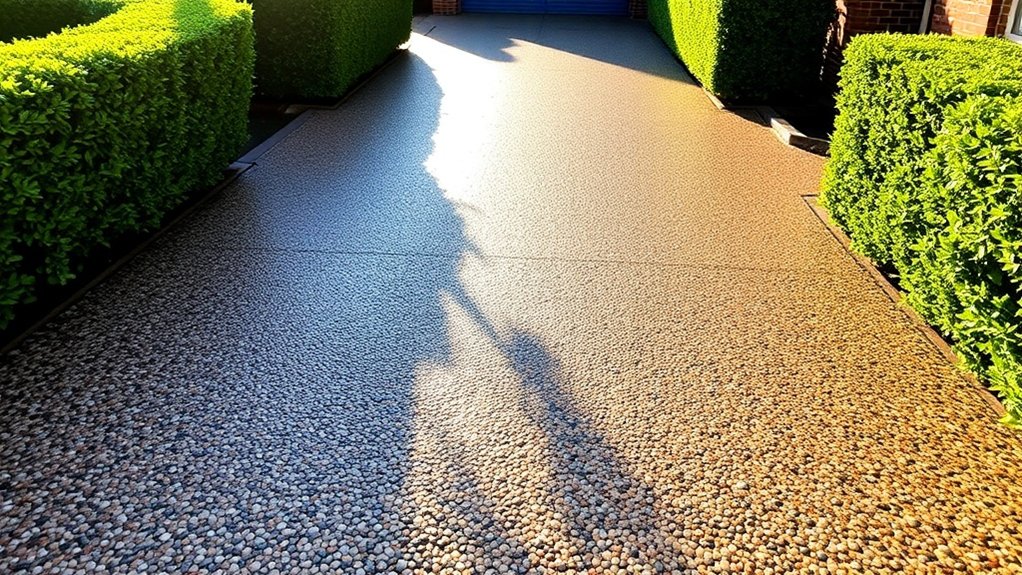
Understanding the physical properties of resin-bound driveways is crucial for reducing the formation of tyre marks. The flexibility and elasticity of resin allow the surface to absorb ground movements without cracking, which is essential for minimising tyre marks. This elasticity also helps manage temperature fluctuations, preventing damage that could trap rubber. Moreover, the permeable structure facilitates water drainage, reducing moisture that can worsen tyre marks. High-quality UV stabilisation ensures the surface remains hard, preventing softening in heat, while a robust surface resists the transfer of rubber from tyres. Additionally, the thermal properties of resin minimise the risk of softening, making it easier to remove any embedded marks. This permeability supports Sustainable Urban Drainage Systems, which maintains driveway integrity by effectively managing surface water. These features collectively help maintain a clean and attractive driveway, free from unsightly stains, especially when regular sweeping with a hard broom is practiced.
Maintenance Practices to Prevent Tire Marks
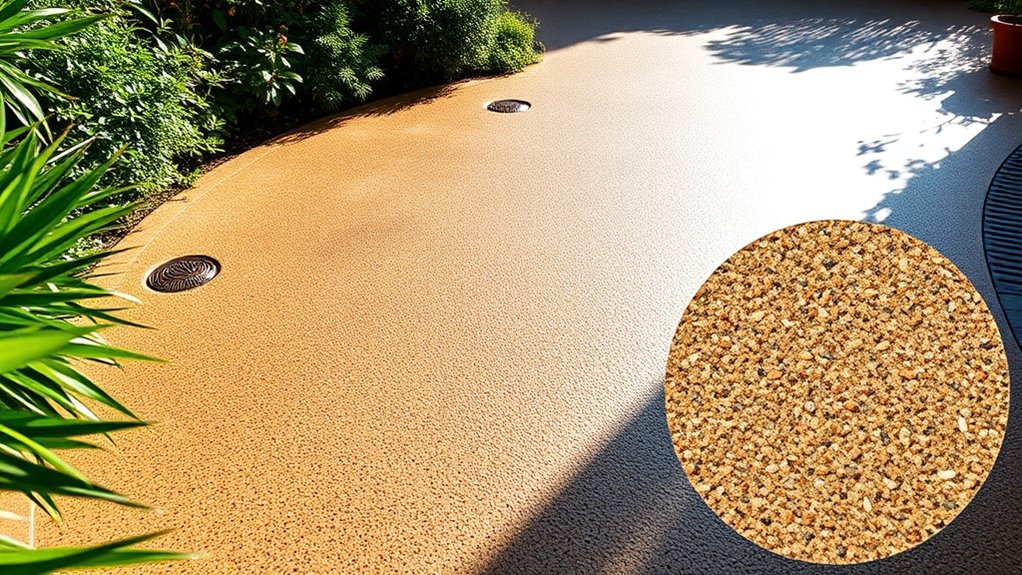
To keep your resin-bound driveway in top condition and minimise tyre marks, it’s essential to adopt effective maintenance practices.
Regular upkeep can significantly improve both the appearance and longevity of your driveway. Here are some straightforward tips:
- Regular Sweeping: Clear away debris that could lead to tyre marks.
- Pressure Washing: Use with care to remove ingrained dirt and light stains.
- Surface Inspection: Check for early signs of wear to prevent more serious damage later; conduct routine checks to ensure proper drainage maintenance.
- Cleaning Spills: Deal with spills promptly to avoid permanent staining.
Additionally, regular maintenance is crucial for ensuring that your driveway remains low-maintenance and durable over the years.
By following these maintenance tips, you can ensure your driveway stays looking its best, reducing the risk of tyre marks and extending its lifespan.
Consistent care is key to maintaining an attractive and practical resin-bound driveway.
Oil & Chemical Stain Resistance
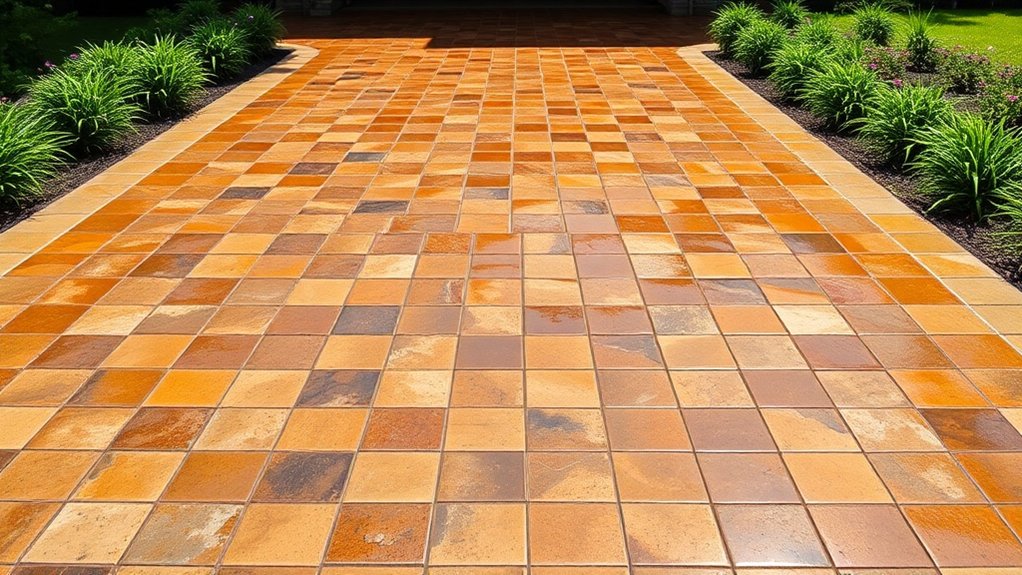
Resin-bound driveways provide excellent resistance to oil and chemical stains, but they aren’t entirely immune to damage.
Their smooth, non-porous surface effectively prevents oil from soaking in, making it easy to clean up small spills quickly. For minor accidents, simply wash the area with mild detergent and water to prevent any permanent marks.
For tougher stains, use a specialised degreaser made for resin surfaces, as the hard finish allows for effective scrubbing. While the resin matrix resists oil absorption, prolonged exposure can still cause discolouration.
Avoid using harsh chemicals like bleach, as these can compromise the resin’s integrity. Regular cleaning will help maintain both the appearance and chemical resistance of your driveway.
Environmental & Durability Factors
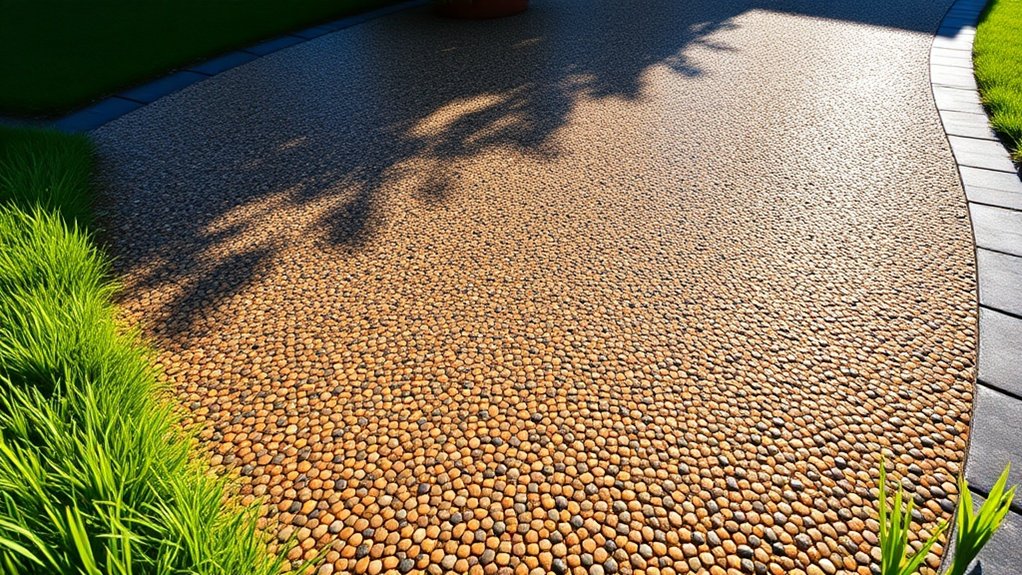
When considering resin-bound driveways, you’ll appreciate that UV stability ensures the surface retains its look over time, even in direct sunlight.
These driveways are also highly resistant to temperature fluctuations, meaning they won’t crack in extreme weather.
Plus, using eco-friendly materials in their construction means you’re making a sustainable choice while benefiting from a long-lasting solution for your home.
UV Stability Benefits
UV stability is crucial for the performance and lifespan of resin-bound driveways, affecting both their durability and environmental impact.
Using UV-stable resins offers several key benefits:
- Enhanced UV protection prevents fading and discolouration.
- Increased longevity reduces the need for frequent repairs and replacements.
- Maintains structural integrity, minimising brittleness and cracking.
- Environmentally friendly properties promote sustainable urban drainage.
These features help keep your driveway looking good while lowering maintenance costs in the long run.
With UV-stable resin systems, you ensure your driveway can withstand the elements, preserving its strength and beauty while supporting a greener environment.
Temperature Resistance Features
Temperature resistance features are crucial for the performance and longevity of resin-bound driveways, ensuring they can cope with environmental stresses.
These driveways can expand and contract flexibly, handling temperatures from -20°C to 60°C without cracking. The resin’s rubber-like flexibility allows for slight movements, which means there’s no need for expansion joints.
Special formulations provide high-temperature resistance, preventing the surface from softening in prolonged heat, thus maintaining stability. Lighter-coloured finishes also help reflect heat, reducing surface temperatures and minimising tyre marks.
In addition, quality resin systems are frost-resistant, preserving their integrity in cold conditions. Altogether, these features ensure your driveway remains durable and attractive, no matter the season.
Eco-Friendly Material Use
Resin-bound driveways provide excellent temperature resistance and are made from eco-friendly materials, promoting environmental sustainability and durability.
By using sustainable sourcing methods, these driveways have a positive impact:
- Recycled aggregates such as glass, stone, and plastics help reduce the need for new materials.
- The cold-mix application reduces energy consumption, which lowers the carbon footprint during installation.
- Their UV-stable composition ensures they last 20–25 years with minimal wear and tear.
- Fully permeable surfaces allow natural water drainage, protecting local waterways.
Choosing resin-bound driveways conserves resources and contributes to a cleaner environment, making them a responsible option for modern homeowners.
Comparative Advantages Over Other Surfaces
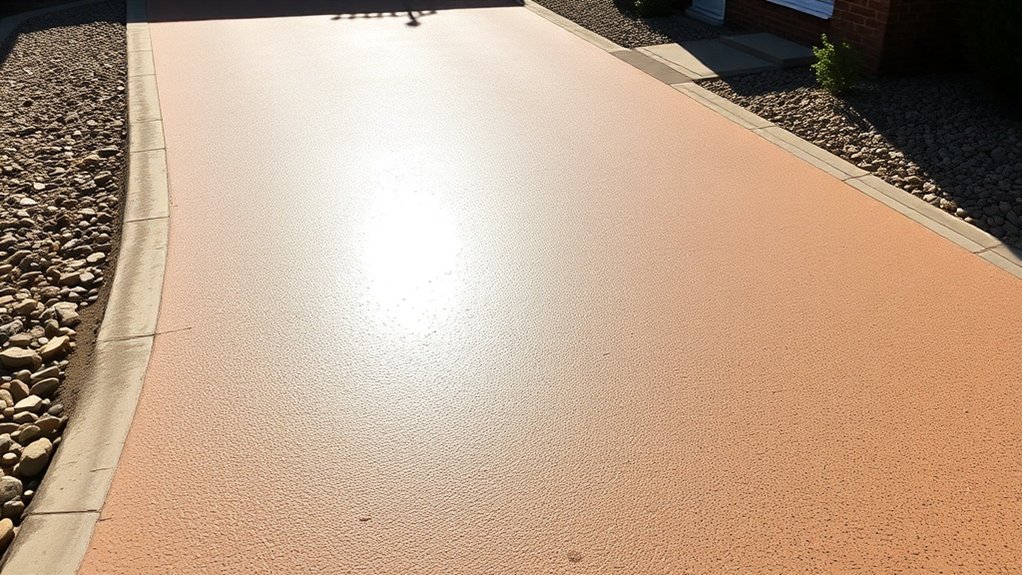
Choosing a resin-bound driveway means opting for a surface that effectively prevents gravel displacement, providing stability for both foot and vehicle traffic.
Its firm surface reduces the likelihood of unevenness over time, making it a reliable choice.
Plus, the smooth finish not only looks great but also makes cleaning and maintenance a breeze, unlike traditional surfaces.
Gravel Displacement Prevention
One significant benefit of resin-bound driveways is their exceptional ability to prevent gravel displacement, unlike traditional surfaces. The innovative gravel lock mechanism ensures a stable surface that can handle tire pressure effectively.
Here are the key advantages:
- The aggregates are fully mixed with resin, creating a bonded surface that stops gravel from moving.
- The solidified resin distributes the weight of vehicles evenly, reducing the risk of aggregate shifting.
- It’s permeable, allowing rainwater to drain away and minimising washout during heavy downpours.
- The enhanced structural cohesion helps prevent gravel from migrating when turning or braking.
Enhanced Surface Firmness
Resin-bound driveways are a strong choice for those concerned about cracking and shifting surfaces. By combining resin with aggregates, they create a solid surface that withstands the weight of vehicles and foot traffic.
The interlocking aggregates distribute loads effectively, which helps prevent potholes and tire impressions. Unlike rigid materials, these driveways can flex under pressure without breaking.
With a consistent thickness, they provide reliable support and minimise weak spots. Additionally, UV-stable resins protect the surface from weather changes.
This combination results in a durable, level surface that significantly reduces the chances of tyre marks and oil stains.
Smooth Finish Benefits
Resin-bound driveways provide a smooth finish that significantly improves both functionality and appearance compared to traditional surfaces.
This sleek look not only enhances your property’s appeal but also offers several practical benefits:
- Durability: It withstands extreme weather conditions, ensuring long-lasting smoothness.
- Low Maintenance: Requires minimal upkeep, typically just the occasional pressure wash.
- Safety Features: Offers excellent traction, reducing the risk of slipping, particularly in wet conditions.
- Design Versatility: Comes in a range of colours and textures to match your style.
These benefits make resin-bound driveways an excellent option, combining modern aesthetics with reliable performance and safety.
You’ll enjoy the blend of elegance and practicality they bring to your home.
Long-Term Benefits of Resin-Bound Driveways
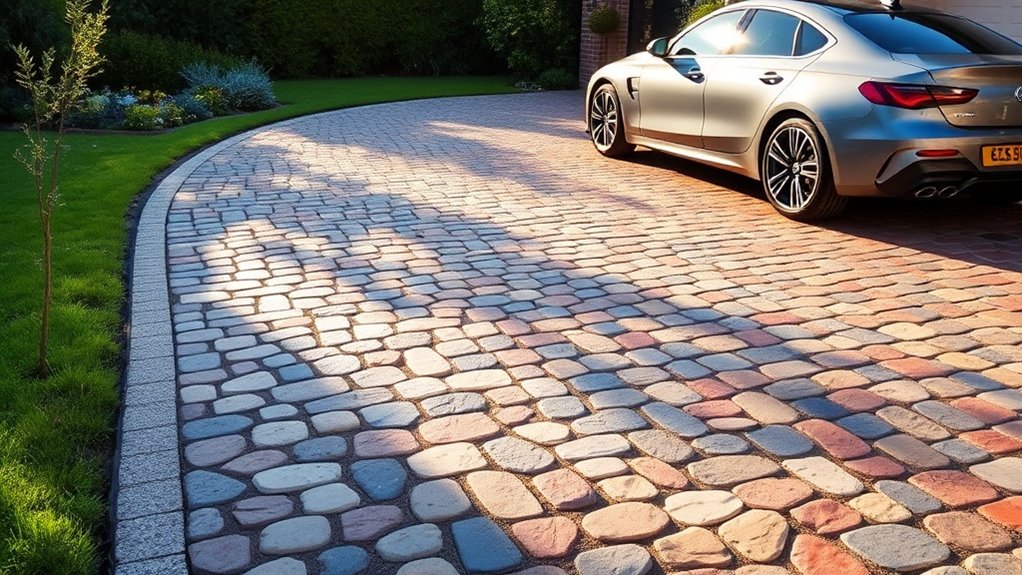
When looking for a driveway that lasts, resin-bound driveways offer significant long-term benefits. Their durability and resistance to weather ensure that your driveway remains intact, even in harsh conditions, without cracking or eroding.
With a lifespan of up to 25 years, the quality of installation plays a crucial role in achieving this longevity.
The smooth surface helps prevent weed growth and makes cleaning simple, meaning less maintenance for you over time.
Plus, resin-bound driveways come in a variety of aggregate colours, enhancing your property’s curb appeal and potentially increasing its value.
Their permeable nature allows for effective drainage, which meets local regulations and supports eco-friendliness.
Frequently Asked Questions
How Long Does a Resin-Bound Driveway Last?
A resin-bound driveway usually lasts between 15 to 25 years. Its lifespan can vary based on installation quality and environmental factors. To help it last longer, keep it clean and address any damage quickly. Regular maintenance, like sweeping and rinsing, can make a big difference.
Can I Install a Resin-Bound Driveway Myself?
Yes, you can install a resin-bound driveway yourself using DIY kits available in the UK. Just ensure you prepare the base properly and mix the resin materials accurately for the best results. Follow the instructions closely to avoid any problems during the application. For instance, using a level to check your base will help ensure a smooth finish.
What Is the Cost of a Resin-Bound Driveway?
A resin-bound driveway generally costs about £6,000 for an average-sized project. Its impressive durability means you’ll spend less time and money on maintenance, making it a cost-effective choice in the long run.
Are Resin-Bound Driveways Suitable for All Climates?
Yes, resin-bound driveways are suitable for all climates thanks to their durable resin and adaptability. They can handle temperature extremes and resist cracking. However, it’s essential to ensure proper installation and maintenance for optimal performance in different weather conditions. For instance, they can cope well with both the frosty winters and the hot summers we experience in the UK.
How Does the Installation Process Work?
The installation process includes assessing the site, preparing the base, and mixing resin with aggregates. First, excavate and compact the sub-base, ensuring proper drainage. Then, apply the mixture evenly and allow it to cure thoroughly for the best results.
Conclusion
In summary, resin-bound driveways combine durability with visual appeal, effectively resisting tire marks and oil stains. By opting for this surface, you’re not merely paving a driveway; you’re creating a clean and lasting entrance to your home. With simple maintenance, you can ensure a smooth and welcoming pathway, free from the unsightly blemishes that often affect traditional driveways. Consider the benefits of resin-bound solutions for a practical and attractive option.
